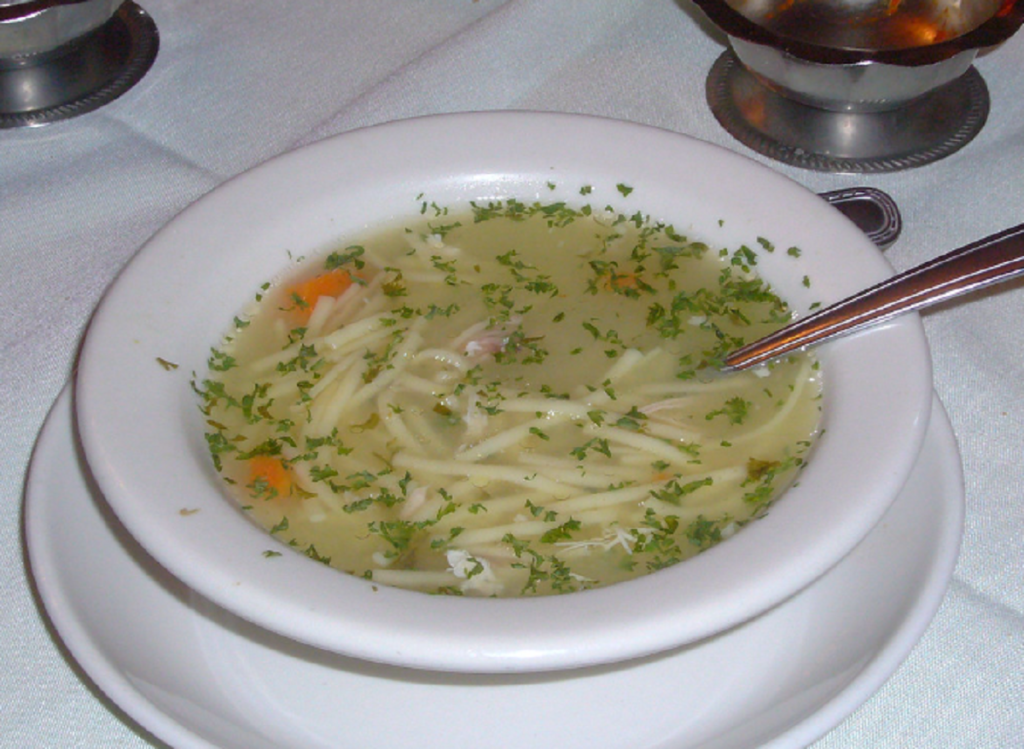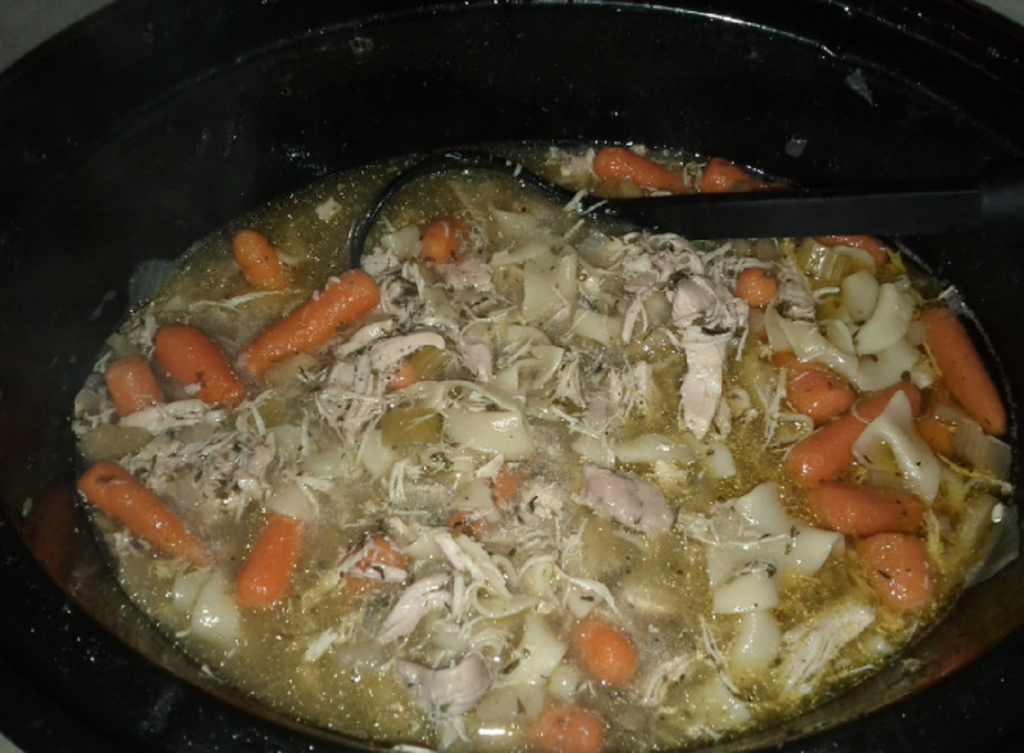In the quest for comfort foods that not only warm the soul but also nourish the body, chicken noodle soup often emerges as a top contender. But amidst the cozy bowls and steamy sips, a question lingers—Is chicken noodle soup healthy? This article dives into the heart of the broth, unraveling the nutritional tapestry woven by its ingredients, and exploring the balance between its comforting essence and health benefits. From the immune-boosting properties to the potential pitfalls of sodium content, we’ll ladle through the facts, offering insights into making this beloved dish a healthier choice. So, grab your spoon as we embark on a flavorful journey through the world of chicken noodle soup.
Introduction
Is chicken noodle soup healthy?

Ah, chicken noodle soup—a timeless elixir of comfort that has graced countless tables and soothed many souls. It’s the go-to remedy for cold days, sick days, and hey, even the good days. But beyond its warm embrace, lies the question of its healthfulness. Is this bowl of goodness truly beneficial for our well-being, or is it just a heartwarming myth?
Chicken noodle soup, with its rich broth, tender chicken, and hearty vegetables, seems like a nutritional powerhouse at first glance. Yet, as with any dish, the devil is in the details—or in this case, the ingredients and preparation. This article will peel back the layers of this beloved soup, examining its components, benefits, and areas where caution is warranted.
We’ll explore the nutritional breakdown, highlighting the vitamins, antioxidants, and proteins that contribute to its reputed health benefits. However, it’s not all spoonfuls of comfort; we’ll also address the concerns surrounding sodium content and processed ingredients that often sneak into our bowls.
But fear not, soup aficionados! We’re not just here to critique; we’re also stirring up solutions. Tips for crafting a healthier bowl, from choosing whole, nutritious ingredients to reducing sodium, will ensure your chicken noodle soup remains a staple in a balanced diet.
So, whether you’re seeking solace in a bowl during flu season or simply craving a taste of home, join us as we delve into the savory depths of chicken noodle soup’s health credentials. Let’s discover together if this culinary classic can be both a balm for the soul and a boon for the body.
Nutritional Breakdown
What’s in your bowl?

Diving into the heart of chicken noodle soup, we uncover the essence of what makes this dish a staple across cultures. It’s more than just comfort food; it’s a concoction that can be packed with nutritional value, depending on the ingredients you ladle into your bowl.
Ingredients Analysis
Chicken: The star of the show, chicken, is a fantastic source of protein, essential for muscle repair and growth. Opting for lean parts like breast meat can keep the fat content in check while still providing a hearty dose of this crucial macronutrient.
Noodles: Ah, the noodles—where would chicken noodle soup be without them? While traditional recipes call for white flour noodles, switching to whole grain can amp up the fiber content, supporting digestion and providing a slower release of energy to keep you fueled for longer.
Broth: The broth, rich and soul-warming, is where much of the magic happens. A homemade broth can be a treasure trove of vitamins and minerals, especially if you’re simmering bones to create a bone broth. This process can leach beneficial nutrients like calcium and magnesium into your soup, not to mention the gelatin, which is great for joint health.
Vegetables: Carrots, celery, and onions are the traditional veggie trio in chicken noodle soup, offering a boost of fiber, vitamins C and K, and antioxidants. These nutrients are pivotal for immune function, eye health, and even skin vitality. Don’t shy away from adding more greens like spinach or kale for an extra nutrient punch.
Caloric Content and Serving Size
While chicken noodle soup can be a low-calorie option, especially beneficial for those watching their weight, the caloric content can vary widely based on the ingredients used. A broth-based soup with plenty of vegetables and lean chicken is on the lighter side, while creamier versions or those with added oils can tip the scales.
Serving size also plays a crucial role in the nutritional impact of your soup. A moderate bowl can serve as a nourishing meal with a balance of proteins, carbs, and vegetables. However, indulging in a large bowl or going back for seconds can quickly double the caloric intake, turning a healthy meal into a caloric surplus.
In essence, the nutritional value of chicken noodle soup is as varied as its recipes. By choosing whole, nutrient-rich ingredients and keeping an eye on portions, this comforting classic can indeed be a healthy addition to your diet.
Health Benefits
The Good Side of Chicken Noodle Soup
Beyond its reputation as a comfort food, chicken noodle soup harbors a wealth of health benefits that can contribute positively to our well-being. Let’s ladle through the goodness this humble soup can offer.
Immune System Support
One of the most celebrated virtues of chicken noodle soup is its ability to bolster the immune system. The broth, rich in vitamins and minerals, along with the antioxidants from the vegetables, creates a nurturing environment for the body to fight off viruses and recover from illness more swiftly. The chicken itself is not just a source of protein but also contains selenium, a trace element known for its immune-boosting properties.
Hydration and Electrolytes
Sipping on a warm bowl of chicken noodle soup can be incredibly hydrating, especially when you’re under the weather. The broth is a source of electrolytes, such as sodium and potassium, which are crucial for hydration and maintaining the body’s fluid balance. This makes chicken noodle soup an excellent choice for rehydration after a bout of illness or even during recovery.
Comfort Food Factor
Never underestimate the power of comfort food on our overall health. Chicken noodle soup, often associated with warmth and care, can have a positive effect on one’s psychological well-being. The act of enjoying a bowl of soup, especially one that holds personal or cultural significance, can evoke feelings of comfort and nostalgia, providing a soothing effect that transcends the physical benefits of its ingredients.
Moreover, the warmth of the soup can help alleviate congestion and promote sinus relief, making it a go-to remedy during cold and flu season. The steam from the hot broth helps open nasal passages, while the warm liquid soothes the throat and eases coughing, providing a natural method to relieve cold symptoms.
In essence, chicken noodle soup serves as a multifaceted dish that not only nourishes the body but also comforts the soul. Its blend of nutrients, hydration benefits, and the sheer comfort it provides, make it a worthy addition to any diet, especially during times when the body needs a little extra care and nourishment.
Potential Downsides
When Soup Isn’t Super
While chicken noodle soup can be a beacon of comfort and nutrition, it’s not without its pitfalls. Awareness of these potential downsides can help you navigate towards a healthier bowl without compromising on the soul-soothing essence of this classic dish.
Sodium Content Concerns

One of the most significant concerns with chicken noodle soup, especially store-bought varieties, is the high sodium content. Excessive sodium intake can lead to hypertension and cardiovascular issues over time. It’s crucial to read labels carefully or, better yet, prepare your soup at home where you can control the amount of salt added. Opting for low-sodium broth or using herbs and spices for flavor can help mitigate this issue, ensuring your comforting bowl remains heart-friendly.
Processed Ingredients and Additives
Pre-packaged or canned chicken noodle soups often contain processed ingredients and additives that can detract from the health benefits of homemade versions. Preservatives, artificial flavors, and added sugars can turn a potentially healthy meal into a less desirable option. Embracing the homemade route allows you to select whole, fresh ingredients, steering clear of unnecessary additives and embracing the soup’s nutritional potential.
Balance and Variety in Diet
Relying too heavily on chicken noodle soup, or any single food, can lead to nutritional imbalances. While chicken noodle soup can be a nutritious part of your diet, it’s important to remember the value of variety. Ensuring a diet rich in fruits, vegetables, whole grains, and lean proteins, alongside your favorite soups, guarantees a wider range of nutrients and health benefits. Chicken noodle soup can be a comforting staple, but it should complement a diverse and balanced diet.
In conclusion, while chicken noodle soup holds a cherished place in many cultures as a symbol of comfort and healing, it’s essential to approach it with a mindful eye towards sodium and ingredient quality. By choosing or making versions with low sodium and whole, nutritious ingredients, you can enjoy this timeless dish’s benefits without the downsides. Remember, the healthiest diet is one that embraces variety, balance, and moderation, with chicken noodle soup serving as one delicious part of the whole.
Making Healthier Choices
Crafting a Healthier Bowl
Embracing chicken noodle soup’s comforting warmth without compromising on health requires a mindful approach to its preparation and ingredients. Here are some tips to elevate your soup from a simple comfort dish to a nutritious powerhouse.
Choosing Whole, Nutritious Ingredients
The foundation of a healthier chicken noodle soup lies in its ingredients. Opt for lean cuts of chicken like breast meat to reduce fat content while maintaining high levels of protein. Whole grain or whole wheat noodles offer more fiber and nutrients than their white flour counterparts, contributing to a more satisfying and healthful dish.
Incorporating a variety of vegetables not only enhances the flavor profile but also boosts the soup’s vitamin and mineral content. Carrots, celery, and onions are traditional, but don’t hesitate to add greens like kale or spinach for an extra nutrient kick. These additions can help increase your daily vegetable intake effortlessly.
Reducing Sodium
High sodium levels can be a concern, particularly with store-bought soups or broths. When making chicken noodle soup at home, control the sodium by using low-sodium broth or making your own from scratch. Season with herbs and spices like thyme, rosemary, and black pepper instead of relying solely on salt for flavor. This approach allows you to enjoy the soup’s comforting warmth without the health risks associated with high sodium intake.
For additional insights on managing sodium in your diet, the CDC Guidelines on Sodium Intake offer valuable information on understanding sodium recommendations and making healthier food choices.
Adding More Vegetables
Vegetables are not just fillers; they’re nutrient-dense additions that can transform your soup into a veritable health elixir. Beyond the classic trio of carrots, celery, and onions, consider adding mushrooms for their immune-boosting properties, bell peppers for vitamin C, or zucchini for a low-calorie boost of fiber. These vegetables not only add color and texture but also increase the soup’s overall nutritional value, making each spoonful a step towards better health.
Crafting a healthier bowl of chicken noodle soup is an exercise in creativity and mindfulness. By choosing whole ingredients, reducing sodium, and packing in the vegetables, you can transform this beloved comfort food into a nourishing meal that satisfies both the body and soul. Remember, the key to a healthier diet is balance, and a well-crafted bowl of chicken noodle soup can fit beautifully within a balanced and nutritious eating plan.
FAQs
Frequently Asked Questions
Chicken noodle soup, with its universal appeal as a comfort food and its reputed health benefits, naturally raises questions among its enthusiasts. Here are answers to some of the most commonly asked questions, shedding light on this beloved dish’s nutritional profile and best practices for consumption.
Is chicken noodle soup healthy or unhealthy?
Chicken noodle soup can be incredibly healthy if prepared with the right ingredients. Opting for lean chicken, whole grain noodles, a variety of vegetables, and a low-sodium broth can make it a nutritious option. It provides a good balance of protein, essential vitamins, and minerals, making it a wholesome choice for a meal. However, store-bought versions high in sodium and processed ingredients can tip the scales towards unhealthy.
Is it OK to eat chicken soup every day?
While chicken noodle soup can be a part of a healthy diet, variety is key to ensuring you receive a broad spectrum of nutrients. Eating chicken noodle soup every day might limit your intake of other essential nutrients found in a diverse diet. It’s best enjoyed as part of a balanced diet that includes a wide range of fruits, vegetables, whole grains, and lean proteins.
Does chicken noodle soup actually help when sick?
Yes, chicken noodle soup can be beneficial when you’re sick. The warm broth helps with hydration and can soothe a sore throat, while the steam may alleviate nasal congestion. The soup’s nutrients can support the immune system, and the easy-to-digest nature of the ingredients makes it a gentle choice for an upset stomach. However, it’s not a cure-all and should be part of a comprehensive approach to recovery that includes plenty of rest and hydration.
Incorporating chicken noodle soup into your diet, especially during cold and flu season, can offer comfort and nutritional benefits. However, it’s important to remember that a balanced diet, rich in a variety of foods, is the best strategy for maintaining health and well-being. By paying attention to the ingredients and preparation methods, you can enjoy this timeless dish as a nourishing part of your eating plan.
Conclusion
The Verdict on Chicken Noodle Soup
As we’ve ladled through the layers of chicken noodle soup, from its comforting warmth to its nutritional content, it’s clear that this beloved dish can indeed be a healthy choice. The key lies in the selection of ingredients and the method of preparation. By opting for lean proteins, whole grains, a bounty of vegetables, and a mindful approach to sodium, chicken noodle soup transforms into a nourishing meal that supports well-being.
However, it’s also evident that moderation and variety are crucial. While chicken noodle soup can play a comforting role in our diets, especially during times of illness or when seeking a taste of home, it’s important to incorporate a wide range of foods to ensure a balanced intake of nutrients.
In essence, chicken noodle soup embodies the principle that food can be both a source of comfort and nutrition. Whether you’re under the weather or simply in need of a warm hug in a bowl, this classic dish, prepared thoughtfully, can be a wholesome addition to any diet. So, the next time you reach for that spoon, remember that, with the right ingredients, chicken noodle soup is not just good for the soul but good for the body too.

